Содержание
VPN, or Virtual Private Networks, have become an integral part of the modern internet, offering users privacy protection and access to restricted resources. However, the legal status of VPN usage varies globally, making it essential to understand the current legal landscape.
VPNs Help to:
- Bypass regional restrictions
- Ensure privacy and security online
- The legal status of VPNs differs from country to country.
History of VPN Regulation
Since their inception, VPNs have evolved significantly. Initially used in corporate environments, they quickly gained popularity among private users. The legal aspects of VPN usage have also undergone substantial changes.
- Initially, VPNs were used solely for corporate purposes.
- As they became popular with private users, countries began introducing regulatory laws.
- Major events like data breaches and cyber threats accelerated the introduction of legislation.

Legal Situation in Different Countries (Key Regions)
Europe
European countries have diverse approaches to regulating VPN usage. Some countries enforce strict laws to monitor internet activity, while others follow a more liberal approach, protecting privacy rights and internet freedom.
- European Union (EU):
The EU is highly active in data protection and privacy issues, as reflected in regulations like the General Data Protection Regulation (GDPR).
In most EU countries, VPN usage is legal, but companies must adhere to strict rules regarding the protection of personal data. - Germany:
Germany has stringent regulations on internet activity, particularly focused on combating terrorism and cybercrime, which includes monitoring internet traffic.
VPN use is legal, but providers may be required to provide user data to law enforcement agencies upon request. - France:
France actively combats cybercrime and terrorism, leading to strict control over internet activity.
VPN providers are required to register and comply with data retention laws, providing user data when necessary. - Sweden:
Known for its liberal internet laws, Sweden offers robust user rights protections.
VPN use is legal and widespread, with laws ensuring a high level of personal data protection. - Netherlands:
The Netherlands supports free internet use and VPNs, balancing security with privacy rights.
The country’s laws aim to protect user rights while minimizing government interference in internet activities.
North America
The legal situation surrounding VPNs in North America varies, but generally, VPNs are legal and widely used, particularly for data protection and privacy.
- USA:
VPN use is legal, but the government and ISPs have significant powers to monitor internet traffic.
Laws like the Patriot Act allow authorities to track online activity for national security purposes, which may include requesting data from VPN providers. - Canada:
Canada shares a similar approach with the US, focusing on data protection and privacy.
Data protection laws require companies to follow strict guidelines, but VPN use remains legal and popular in the country.
Asia
Asian countries are known for their strict regulation of internet activity and VPN usage due to political and social factors.
- China:
China has some of the strictest laws in the world regarding internet and VPN usage. The “Great Firewall” limits access to international resources.
Using unauthorized VPNs is illegal and can lead to serious consequences, including fines and criminal charges. - India:
India has recently introduced new laws aimed at regulating VPN usage in response to growing cybercrime and security threats.
The laws require VPN providers to retain user data and provide it upon government request, raising concerns about privacy. - Japan:
Japan takes a more liberal approach compared to other Asian countries, with legislation focusing on user rights and data privacy.
VPN use is legal and widespread, especially among private users and companies involved in international business.
These regional differences in VPN regulation highlight the importance of understanding local laws before using a VPN in any country.
Legal Situation in Specific Countries
China
China’s internet and VPN laws are among the strictest globally. The country is well-known for its “Great Firewall,” which restricts access to international websites and controls users’ online activity.
- Restrictions and Sanctions on VPN Usage:
Using government-unlicensed VPNs is illegal. In 2017, the government tightened control, requiring all VPN providers to obtain official authorization.
Violating these rules can lead to severe penalties, including hefty fines and criminal charges. Private individuals and companies using unlicensed VPNs risk harsh sanctions. - Legislation and Its Consequences:
The 2015 Cybersecurity Law increased internet monitoring and imposed strict security requirements on companies.
In 2017, the Ministry of Industry and Information Technology (MIIT) issued a directive banning unlicensed VPNs. - Practical Application of the Law:
Despite the strict laws, many private users continue to use unlicensed VPNs to bypass censorship, although they risk detection and punishment.
Companies operating in China are often forced to use licensed VPNs, limiting their options and increasing costs.

Russia
Russia also has stringent laws governing VPN use, aimed at controlling internet activity and combating extremism, cybercrime, and illegal content.
- Current Laws and Regulations:
In 2017, a law was passed banning technologies that allow users to bypass internet blocks, including VPNs and anonymizers. These measures are aimed at preventing access to banned websites.
VPN providers are required to block access to websites on the Roskomnadzor blacklist. - Practical Application of the Law:
Providers and users face fines for violating the law. VPN providers that do not comply with the requirements risk being blocked in Russia.
In 2019, Roskomnadzor began actively blocking popular VPN services that refused to comply with content blocking requirements. - Impact on Users and Business:
Private users face access restrictions to international resources and risks to their privacy. Many continue to use VPNs to bypass restrictions despite the risk of penalties.
For businesses, compliance with the law requires additional expenses for licensed VPNs and security requirements.
India
India has recently implemented new laws regulating VPN usage, sparking considerable debate and concern among users and companies.
- Key Features of Regulation:
In 2021, India introduced laws requiring VPN providers to store user data for 180 days and provide it to authorities upon request. These measures were taken to combat cybercrime and terrorism.
Providers must also register and disclose information about their activities. - Impact on Users and Business:
The new laws have raised concerns about data privacy.
Users fear that their personal information could be accessed by the government.
For businesses, compliance with these new requirements means additional costs for data storage and security. VPN service providers face the challenge of adapting to these rules or risk ceasing operations in India. - Practical Application of the Law:
Despite strict laws, VPNs are widely used in India, particularly to bypass censorship and access international resources.
VPN providers are trying to find a balance between complying with local laws and providing quality services, which may involve moving servers or adapting privacy policies.
These examples show how the legal situation in different countries can significantly impact VPN usage, necessitating adaptation for both private users and businesses.
The Impact of Regulation on Users and Businesses
Laws and regulations governing VPN use have a significant impact on both private users and businesses. Let’s explore how VPN regulation affects different aspects of people’s lives and organizations’ operations.
Impact on Private Users
VPN regulation can greatly affect private users, especially in countries with strict laws. Key areas of impact include access to content, data privacy, and legal safety.
- Content Access Restrictions:
In countries with strict regulations like China and Russia, users may face restrictions on access to international websites and services. This limits freedom of information and online communication.
Even in less restrictive countries, users may encounter limitations if VPN providers are required to block certain resources. - Data Privacy:
One of the primary reasons for using a VPN is to protect personal data. However, laws requiring VPN providers to store user data and provide it to authorities undermine this principle.
In India and other countries, new laws forcing VPNs to log user activity raise concerns about privacy. - Legal Safety:
In countries with strict laws, VPN users face legal risks. In China and Russia, for instance, using unlicensed VPNs can result in fines and other penalties.
Even in more liberal countries, users must be careful not to violate local laws.
Impact on Business
For businesses, using a VPN comes with several challenges, especially in terms of complying with local laws and ensuring data security.
- Compliance with Laws:
Companies operating internationally must consider local VPN laws in every country they do business in. This may include requirements for VPN registration, content blocking, and data retention.
Failure to comply with local laws can result in fines, service blockages, and other legal consequences. - Data Protection and Security:
For many companies, VPNs are essential for protecting data and ensuring secure remote access for employees. However, laws requiring data storage may increase the risk of leaks and cyberattacks.
Companies need to invest in additional security measures to protect customer and employee data under strict regulatory conditions. - Economic and Operational Costs:
Complying with VPN laws can require significant financial investment. For example, companies may be forced to use licensed VPN services, which are often more expensive.
Additional costs may include registration, legal consultations, and technical measures to meet security requirements. - Limiting Business Opportunities:
In some countries, VPN restrictions can make it harder to conduct business, particularly for IT and telecommunications companies.
This may limit opportunities for growth and international expansion.
Examples:
- Companies in China:
Chinese companies working with international partners are often forced to use licensed VPNs, which limit their options and increase costs.
Some companies must adapt their business models and strategies to comply with local laws. - Companies in Russia:
In Russia, companies are required to block access to banned resources and provide user data upon request, increasing costs and reducing privacy.
Many international companies have had to reassess their strategies or completely exit the Russian market.
These examples demonstrate that VPN regulation has a comprehensive impact on both private users and businesses, necessitating adaptation and compliance with local laws to ensure security and legal protection.
Recent Changes and Trends in Legislation
VPN laws and regulations are constantly evolving to reflect changes in political, social, and technological realities. In recent years, there have been significant changes in VPN regulation across various countries, as well as broader trends that may influence future VPN use.
Recent Legislative Changes
Several countries have introduced new laws and tightened existing rules aimed at controlling VPN usage. These changes are driven by factors like combating cybercrime, protecting national security, and monitoring internet activity.
- India:
In 2021, India introduced laws requiring VPN providers to store user data for 180 days and provide it to authorities.
New rules also require VPN providers to register their operations and disclose information about user activity. - Russia:
In 2017, Russia passed a law banning technologies that allow users to bypass internet blocks, including VPNs and anonymizers.
In 2019, Roskomnadzor began actively blocking popular VPN services that refused to comply with content-blocking requirements. - China:
In 2017, the Chinese government tightened control, requiring all VPN providers to obtain official authorization.
The 2015 Cybersecurity Law strengthened control over internet activity and imposed strict security requirements on companies.
Predictions and Future Trends
Current legislative changes and future trends indicate that many countries will continue to tighten control over VPN usage. However, there are also efforts to protect user rights and data privacy.
- Increased Control and Regulation:
In the future, more countries may pass laws similar to those in China, Russia, and India, including mandatory VPN licensing and data retention requirements.
Increased control over VPNs may be driven by growing cybercrime, terrorism, and other security threats. - Higher Data Security Standards:
In response to growing cyber threats, countries may tighten data security standards for VPN providers.
Companies will need to invest in additional security measures to meet new standards and protect user data. - Development of Bypass Technologies:
As VPN regulations become stricter, users and companies will look for new ways to bypass blocks and protect their privacy. This could involve the development of decentralized VPNs (dVPNs) and other innovative solutions.
Such technologies may offer greater privacy and security but could face new legal challenges. - International Cooperation and Standards:
In the future, there may be increased international cooperation in VPN regulation and cybersecurity. Countries could develop common standards and share expertise in monitoring and data protection.
This could lead to the creation of international regulations aimed at harmonizing laws and ensuring internet security.
Examples:
- European Union:
The EU actively works on developing common data protection and cybersecurity standards. The GDPR is one example of efforts to ensure a high level of privacy and data security.
In the future, the EU may adopt additional VPN regulations to ensure compliance with high security and data protection standards. - USA:
The USA already has laws like the Patriot Act that allow authorities to track online activity for national security purposes. In the future, further tightening of VPN control can be expected, particularly in the context of fighting cybercrime and terrorism.
However, ongoing discussions around privacy rights could also lead to new laws aimed at balancing security and user privacy.
These examples and predictions show that VPN regulation continues to evolve, reflecting changes in global politics, economics, and technology. Both users and businesses must be prepared to adapt to new laws and requirements to ensure their security and legal compliance.
Conclusion
The legal situation regarding VPNs varies greatly depending on the region. It’s crucial to understand local laws before using a VPN to avoid potential legal issues. Compliance with these regulations can help individuals and businesses navigate the challenges and ensure secure and lawful use of VPNs.




Комментарии к статье